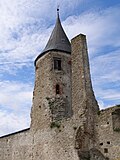Portal:Estonia/Selected article/1
Haapsalu Castle (also Haapsalu Episcopal Castle, Estonian: Haapsalu piiskopilinnus) is a castle with cathedral in Haapsalu, western Estonia. It was founded in the thirteenth century to be a center for Bishopric of Ösel-Wiek. When there is a full moon in the month of August, it is said that an image of a maiden, the White Lady, appears on the inner wall of the chapel.
In 1228, the Archbishop of Riga, Albert of Riga formed a new diocese consisting of Läänemaa, Saaremaa and Hiiumaa and designated Gottfried, an abbot of Dünamünde Cistercian monastery, as the bishop. The bishopric was created as a state of Holy Roman Empire on 1 October 1228, by Henry, King of the Romans. Papal legate Wilhelm of Modena fixed these borders permanently in 1234. The first residence of the Bishopric of Ösel-Wiek was located in Lihula Castle, where with the help of the Livonian Brothers of the Sword, a stronghold was built of stone. In an attempt to avoid conflicts with the influential Order, the Bishop transferred the diocese's residence to Perona, where it was burned by Lithuanians ten years later. A new center for the diocese was chosen in Haapsalu, where an Episcopal stronghold and cathedral were started. Building of the castle went on for three centuries.

